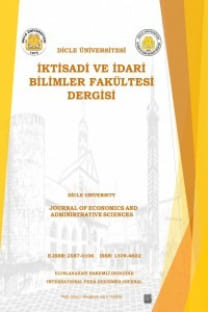NORMATİF GÜÇ AVRUPA YAKLAŞIMI ÜZERİNDEN AB-RUSYA İLİŞKİLERİNİN DEĞERLENDİRMESİ
EVOLUTION OF THE EU-RUSSIAN RELATIONS BY USING CONCEPT OF NORMATIVE POWER EUROPE
___
- Article 1, Constitution of the Russian Federation, https://publicofficialsfinancialdisclosure.worldbank.org/sites/fdl/files/assets/lawlibraryfiles/Russian%20Federation_Constitution_1993_EN.pdf (20.01.2020).
- Article 11, Consolidated version of the Treaty on European Union, https://eurlex.europa.eu/legal-content/EN/TXT/?uri=celex%3A12012M%2FTXT (15.01.2020).
- Article 177, Treaty establishing the European Community (Nice consolidated version) https://eur-lex.europa.eu/legal-content/EN/TXT/?uri=CELEX%3A12002E%2FTXT (15.01.2020).
- Article 6, Consolidated version of the Treaty on European Union, https://eurlex.europa.eu/legal-content/EN/TXT/?uri=celex%3A12012M%2FTXT (15.01.2020).
- Averre, D. (2008). Russian foreign policy and the global political environment. Problems of Post-Communism, 55(5), s. 28-39.
- Averre, D. (2009). Competing rationalities: Russia, the EU and the ‘shared neighbourhood’. Europe-Asia Studies, 61(10), s. 1689-1713.
- Bretherton, C.,ve Vogler, J. (2013). A global actor past its peak?, International Relations, 27(3), s. 375-390.
- Casier, T. (2011). The Bilateral Relations of the Benelux Countries with Russia: Between Rhetorical EU Engagement and Competitive Business Interests. Journal of Contemporary European Studies, 19(2), s. 237-248.
- Casier, T. (2013). The EU–Russia strategic partnership: Challenging the normative argument. Europe-Asia Studies, 65(7), s. 1377-1395.
- Cebeci, M. (2012). European foreign policy research reconsidered: constructing an ‘Ideal Power Europe’ through theory? Millennium, 40(3), s. 563-583.
- Constitution of the Russian Federation, https://publicofficialsfinancialdisclosure.worldbank.org/sites/fdl/files/assets/law-libraryfiles/Russian%20Federation_Constitution_1993_EN.pdf (20.01.2020).
- Delcour, L. (2010). The European Union, a security provider in the eastern neighbourhood?. European security, 19(4), s. 535-549.
- Diez, T. (2005). Constructing the Self and Changing Others: Reconsidering Normative Power Europe'. Millennium, 33(3), s. 613-636.
- Diez, T. (2013). Normative power as hegemony. Cooperation and Conflict, 48(2), s. 194-210.
- Diez, T., & Manners, I. (2007). Reflecting on Normative Power Europe/Power in World Politics. Ed. By F. Berenskoetter, M. Williams, L.
- European Commission (2006) Chapter of acquis / negotiating chapters [online] Availableat:https://ec.europa.eu/neighbourhoodenlargement/policy/glossary/terms/chapters_e n?fbclid=I wAR2Fn6SVjap- JLN1i60GE-ToeMjGHIdlOozCy9i9iAMBB3gpCyB5n5QfL9M [accessed: 25 October 2018]
- Haukkala, H. (2008). The European Union as a regional normative hegemon: the case of European Neighbourhood Policy. Europe-Asia Studies, 60(9), s. 1601-1622.
- Howorth, J. (2010). The EU as a global actor: Grand strategy for a global Grand bargain? JCMS: Journal of Common Market Studies, 48(3), s. 455-474.
- Hyde-Price, A. (2004, October). The EU, power and coercion: From ‘civilian’ to ‘civilising’ power. In CIDEL Workshop, Oslo (pp. 22-23).
- Kavalski, E. (2013). The struggle for recognition of normative powers: Normative power Europe and normative power China in context. Cooperation and Conflict, 48(2), s. 247-267.
- Keene, E. (2013). The naming of powers. Cooperation and Conflict, 48(2), s. 268-282.
- Makarychev, A. S. (2008). Rebranding Russia: norms, politics and power. Who Is a Normative Foreign Policy Actor?, 156.
- Manners, I. (2002). Normative power Europe: a contradiction in terms?. JCMS: Journal of common market studies, 40(2), s. 235-258.
- Manners, I. (2006). Normative power Europe reconsidered: beyond the crossroads. Journal of European public policy, 13(2), s. 182-199.
- Manners, I. (2008). The normative ethics of the European Union. International affairs, s. 45- 60.
- Manners, I. (2013). Assessing the decennial, reassessing the global: Understanding European Union normative power in global politics. Cooperation and Conflict, 48(2), s. 304-329.
- Manners, I., ve; Whitman, R. (2003). The" difference engine' constructing and representing the international identity of the European Union. Journal of European public policy, 10(3), s. 380-404.
- Michalski, A., ve Nilsson, N. (2018). Resistant to Change? The EU as a Normative Power and Its Troubled Relations with Russia and China. Foreign Policy Analysis, 15(3), s. 432-449.
- Niemann, A., ve Bretherton, C. (2013). EU external policy at the crossroads: The challenge of actorness and effectiveness. International relations, 27(3), s. 261-275.
- Özer, Y. (2012). The European Union as a Civilian Power: the case of the EU’s Trade Policy. Marmara Üniversitesi Avrupa Topluluğu Enstitüsü Avrupa Araştırmaları Dergisi, 20(2), s. 63-94.
- Panebianco, S. (2006). Promoting human rights and democracy in European Union relations with Russia and China. Values and Principles in European Union Foreign Policy, s. 130-146.
- Parker, O., ve Rosamond, B. (2013). ‘Normative power Europe’ meets economic liberalism: Complicating cosmopolitanism inside/outside the EU. Cooperation and Conflict, 48(2), s. 229-246.
- Pavlova, Y., ve Romanova, T. (2014). Ideological Rivalry or Trash Discourse? Russia in global affairs, 3.
- Romaniuk, S. N. (2009). Rethinking EU-Russian Relations: ‘Modern’ Cooperationor ‘PostModern’ Strategic Partnership?. Central European Journal of International and Security Studies, 3(2), s. 70-85.
- Romanova, T. (2009). Normative power Europe: a Russian view. In Normative Power Europe in a Changing World: A Discussion. (pp. 91-51). Netherlands Institute for International Relations.
- Romanova, T. (2016). Russian challenge to the EU’s normative power: change and continuity, Europe-Asia Studies, 68(3), s. 371-390.
- Samokhvalov, V. (2017). Russian-European relations in the Balkans and Black Sea region: Great power identity and the idea of Europe. Springer.
- Schmidt-Felzmann, A. (2008). Allforone? EU member states and the Union's common policy towards the Russian Federation. Journal of Contemporary European Studies, 16(2), s. 169- 187.
- Smith, K. E. (2000). The end of civilian power EU: A welcome demise or cause for corncern?.The international spectator, 35(2), s. 11-28.
- Steinkohl, J. (2010). Normative Poker Rivalry? The European Union, Russia and the Question of Kosovo. College of Europe EU Diplomacy Paper 6/2010.
- Timmins, G. (2002). Strategic or pragmatic partnership? The European union's policy towards Russia since the end of the Cold War. European Security, 11(4), s. 78-95.
- Veebel, V., ve Markus, R. (2018). European Normative Power During Ukrainian-Russian Conflict. Baltic Journal of Law& Politics, 11(1), s. 1-20.
- ISSN: 1309-4602
- Yayın Aralığı: 2
- Başlangıç: 2011
- Yayıncı: -
Neslihan TANCI YILDIRIM, Yasemin KÖSE
Fikret OTLU, Erkin Nevzat GÜDELCI
İTALYA'DA YEREL YÖNETİMLER VE GÜVENLİK
AVRUPA’DAKİ AŞIRI SAĞ PARTİLERİN İDEOLOJİK YAPISI
SANAYİSİZLEŞMEYİ ETKİLEYEN FAKTÖRLER ÜZERİNE BİR İNCELEME: TÜRKİYE ÖRNEĞİ
NORMATİF GÜÇ AVRUPA YAKLAŞIMI ÜZERİNDEN AB-RUSYA İLİŞKİLERİNİN DEĞERLENDİRMESİ
